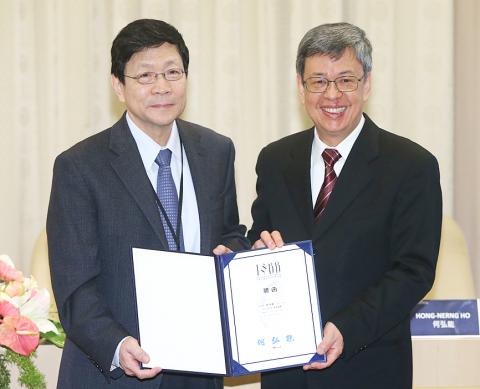Academia Sinica yesterday announced that the Taiwan Biobank, established in 2012, has collected biological information from more than 120,000 volunteers.
The biobank aims to collect genetic samples from more than 200,000 people by 2024 to aid researchers in finding the causes of chronic diseases, as well as their treatment and prevention, Academia Sinica President James Liao (廖俊智) said at the opening ceremony of a symposium on biopreservation and biobanking.
The two-day symposium, cohosted by Academia Sinica’s Institute of Biomedical Sciences, Academia, and the Taiwan Society for Biopreservation and Biobanking, focuses on the sustainability of human biobanks, precision medicine and other issues.

Photo: CNA
Participants are also to hold a round-table discussion of biomedical industry development, ethics, governance and regulations.
The Taiwan Biobank has collected biological data from people aged 30 to 70, including their height, weight, body fat, hipline, waistline, blood pressure, pulse, bone density and pulmonary function, as well as blood sample (30ml) and urine sample (15ml), for genotyping, Academia Sinica said.
Participants were also asked about their lifestyle, diet, living environment, fertility history, and personal and family medical history.
The total length of the human genome is made up of more than 3 billion DNA base pairs, and about 650,000 genetic loci in Taiwanese people can be identified through genotyping, Academia Sinica said, adding that by cross-referencing 650,000 genetic loci with other risk factors, it identified 41 highly precise prognostic biomarkers of diabetes in 2015.
The Taiwan Biobank is the largest infrastructure for Taiwan’s biomedical development, and is the only ethnic biobank in the nation with long-term traceability, Liao said.
The number of voluntary participants has exceeded 120,000, and genotyping and gene chip analysis on more than 100,000 people have been accomplished, which are provided for research and industrial analysis application, Academia Sinica said.
Also present at yesterday’s ceremony were Vice President Chen Chien-jen (陳建仁), Taiwan Biobank Project director Lee Te-chang (李德章), National Health Research Institutes distinguished researcher Tsai Shih-feng (蔡世峯), Taiwan Society for Biopreservation and Biobanking chairman Ho Hong-nerng (何弘能) and nearly 100 academics.

BUSY DAY: After he met with the president and signed an economic development deal, the governor said it was ‘incredibly important that Texas shows solidarity with Taiwan’ Visiting Texas Governor Greg Abbott yesterday announced the opening of a state trade office in downtown Taipei to enhance cooperation and show that “Texas stands with Taiwan.” The State of Texas Taiwan Office is the second foreign office Texas has opened in the 21st century after Mexico, Abbott told a news conference in Taipei. “It shows that other than our geographic neighbor, Texas understands the importance of establishing an office in the country of Taiwan,” he said. “It is incredibly important that Texas shows solidarity with Taiwan, not just for the businesses of Taiwan and Texas — it is important for the entire

DISINFORMATION: Government agencies should be ready to clarify misinformation on Douyin and Xiaohongshu, as they have a large user base in Taiwan, the bureau said More Taiwanese traveling to China, Hong Kong or Macau have been detained or faced trials since Beijing implemented the Anti-Espionage Law and Law on Guarding State Secrets, National Security Bureau (NSB) Director-General Tsai Ming-yen (蔡明彥) said yesterday. Since July last year, 15 Taiwanese have been detained or undergone trials after entering China and the two special administrative regions, while 51 have been interrogated by border officers, Tsai said, adding that the number of cases is increasing. “We respect the Mainland Affairs Council’s decision to raise the travel alert for China from ‘yellow’ to ‘orange,’ meaning that people should avoid non-essential travel.

Some foreign companies are considering moving Taiwanese employees out of China after Beijing said it could impose the death penalty on “die-hard” Taiwanese independence advocates, four people familiar with the matter said. The new guidelines have caused some Taiwanese expatriates and foreign multinationals operating in China to scramble to assess their legal risks and exposure, said the people, who include a lawyer and two executives with direct knowledge of the discussions. “Several companies have come to us to assess the risks to their personnel,” said the lawyer, James Zimmerman, a Beijing-based partner at the Perkins Coie law firm. He declined to identify

NOT ENOUGH: Although the US is to deliver Switchblade 300s and Altius 600M-Vs to Taiwan, military leaders believe the nation needs more attack drones, a source said The Ministry of National Defense (MND) has included the funding needed to mass-produce Type-1 and Type-2 suicide drones in next year’s budget plan, a military source said yesterday. Although the US government last month approved sales of Switchblade 300 loitering munitions and Altius 600M-V uncrewed aerial vehicles to Taiwan, which are scheduled for delivery between this year and the next, military leaders assessed that Taiwan would still have an inadequate number of attack drones to bolster national defense, the source said, asking to remain anonymous. Taiwan needs to mass produce locally made attack drones, including Type-1 and Type-2 suicide drones, they